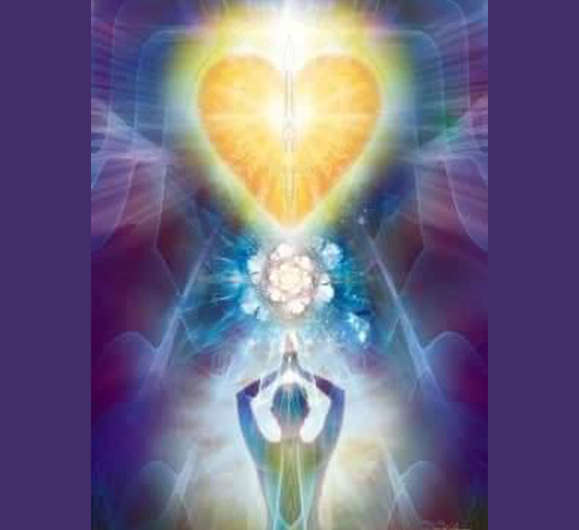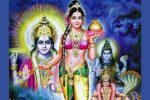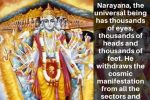Name 93
Pratyayaḥ प्रत्ययः
Pratyaya means consciousness, intelligence, intellect, etc. Brahman is the embodiment of all these qualities. Purest form of Consciousness and the highest form of Intellect is the Brahman. Aitareya Upaniṣad (I.i.3) says, “prajñānam brahma” which means Consciousness is Brahman.
Pratyaya also means faith, trust and conviction. One’s spiritual progression purely depends upon his profoundness of faith, trust and conviction on the Brahman. Spiritual progression happens only in the subtle plane and one may lose faith due to the continued prevalence of ignorance, as the Brahman can only be realised and not be seen. Holy Scriptures like this Sahasranāma imparts spiritual knowledge by describing the subtle qualities of the Brahman.
One who can be relied upon.
Pratyayah according to Sri Adi Sankara is one who symbolises Prateeti or Prajnaanam meaning Universal Consciousness. According to Upanishad ‘Prajnaanam Bramha – Consciousness is Bramhan’.
Sri Parasara Bhattar gives the meaning as ‘One who can be relied upon’. He analyses this as ‘Prateeyate asmin iti pratyayah – One in whom we can place confidence.’
Here’s an interesting episode from the Ramayana.
After befriending Lord Rama, Sugreeva seeks His help to vanquish the mighty Vaali. However, he is overcome by doubt regarding Rama’s prowess to defeat Vali.
Sugreeva begins to extol Vaali’s valour and narrates the episode of Vaali’s fight with the mighty buffalo demon Dundubhi. As Vaali vanquished Dundubhi and hurled it, blood drops fell on Sage Maatanga. He cursed Vaali due to which Vaali is forbidden to enter the Rishyamukha mountain, which has now become a safe haven for us, narrated Sugriva. Sugriva also tells about Vaali’s prowess in piercing massive trees.
Rama in order to quell his doubt and fear decides to demonstrate his prowess to Sugreeva. He sportively flipped the skeletons of Dundubhi by flicking it with his big toe without lifting his feet to a 10 yojana distance which is about 80 kms.
Sugreeva, however, remains unconvinced and says to Rama. That when Vaali hurled it, He was tired, and this buffalo was full of flesh and blood.
Rama smiled at Sugreeva and uses a single arrow to pierce 7 Sala trees. Sugreeva is impressed with Rama’s Valour and brilliance, convinced of his prowess, bows to him.
९३. ॐ प्रत्ययाय नमः |
93. OM Pratyayāya Namaḥ
93) Pratyayah -One whose very nature is Knowledge. That the Supreme is Knowledge Absolute is very well known. It is in the light of Consciousness that all ‘know- ledges’ are possible. ‘Knowledge of a thing’ is the Awareness of its nature. Awareness is Knowledge. Since the Supreme is the One Awareness everywhere, all ‘Knowledges’ spring from the Self. Hence, He is called “the Pure Knowledge”. “Consciousness is Brahman” is one of the Mahaavaakyas.
Prajñānaṃ brahmetyupaniṣadukteḥ pratyayo hariḥ
प्रज्ञानं ब्रह्मेत्युपनिषदुक्तेः प्रत्ययो हरिः
Consciousness. So called as He is the embodiment of consciousness.
Aitareyopaniṣat – Chapter 3
Eṣa brahmaiṣa iṃdra eṣa prajāpatirete sarve devā imāni ca paṃcamahābhūtāni pr̥thivī vāyurākāśa āpo jyotīṃṣītyetānimāni cakṣudramiśrāṇīva, Bījānītarāṇi cetarāṇi cāṃḍajāni ca jarāyujāni ca svedajāni codbhijñāni cāśvā gāvaḥ puruṣā hastino yat kiṃ cedaṃ prāṇi jaṃgamaṃ ca, Pratatri ca yacca sthāvaraṃ sarvaṃ tat prajñānetraṃ prajñāne pratiṣṭhitat, prajñānetro lokaḥ prajñā pratiṣṭhā; prajñānaṃ brahma. (3)
:: ऐतरेयोपनिषत् – तृतीयाध्यायः ::
एष ब्रह्मैष इंद्र एष प्रजापतिरेते सर्वे देवा इमानि च पंचमहाभूतानि पृथिवी वायुराकाश आपो ज्योतींषीत्येतानिमानि चक्षुद्रमिश्राणीव । बीजानीतराणि चेतराणि चांडजानि च जरायुजानि च स्वेदजानि चोद्भिज्ञानि चाश्वा गावः पुरुषा हस्तिनो यत् किं चेदं प्राणि जंगमं च । प्रतत्रि च यच्च स्थावरं सर्वं तत् प्रज्ञानेत्रं प्रज्ञाने प्रतिष्ठितत् । प्रज्ञानेत्रो लोकः प्रज्ञा प्रतिष्ठा; प्रज्ञानं ब्रह्म ॥ ३ ॥
This One is (the inferior) Brahman; this is Indra, this is Prajāpati; this is all these gods; and this is these five elements viz earth, air, space, water, fire; and this is all these (big creatures), together with the tiny ones, that are the procreators of others and referable in pairs – to wit, those that are born of eggs, of wombs, of moisture, and of the earth, viz horses, cattle, men, elephants, and all the creatures that there are which move or fly and those which do not move. All these are impelled by Consciousness; all these have Consciousness as the giver of their reality; the universe has Consciousness as its eye, and Consciousness is its end. Consciousness is Brahman.
One who can be relied upon. Pratiyate Asmin Iti Pratyayah – One in whom we can place confidence. In the Sabha Parva in Mahabharata, we have
“Yadi Te Hrdayam Vetti Yadi Te Pratyayo Mayi
Bhimasenarjunau Sighram Nyasabhutau Prayaccha Me”
If your heart understands me, and if you have faith in me, place Bhima and Arjuna immediately at my disposal. He can be called One whose very nature is Knowledge. That the Supreme is Knowledge Absolute is very well known. It is in the light of Consciousness that all ‘know- ledges’ are possible. ‘Knowledge of a thing’ is the Awareness of its nature. Awareness is Knowledge. Since the Supreme is the One Awareness everywhere, all ‘Knowledge’ spring from the Self. Hence, He is called “the Pure Knowledge”. “Consciousness is Brahman” is one of the Mahaavaakyas.
INTERPRETATION GUIDED BY SANT VANI (WORDS OF SAINTS)
Pratyayaḥ
The one who is in the form of consciousness.
He is pratyaya because He is in the form of every pratīti, knowledge. What we call knowledge of a subject is a collection of cognitions, thoughts related to that subject. Each cognition is a unit of knowledge. Each thought IS. Thoughts of rats also? Yes. Knowledge of cats and cat like human beings? Yes.
The Lord is that because of which every thought is, because of which every thought is known. He is the pratyaya. Pratibhodha-viditam matam–in every pratyaya, cognition, He is understood (Ke.Up.2.4). He is the pratyaya. A lot of Meditation practitioners who are beginners struggle with their thoughts. We will continue to struggle if we do not discover Isvara. It is almost as if thoughts are some sort of aliens that descend on us and we have to conquer them. However, if the reality of the thought is understood no thought is a problem. The glory of the human mind is that there are thoughts. Knowledge takes place because there is a flow of thoughts, whatever be the nature of thoughts.
“Thoughts are the product of a conditioned mind. The natural state of mind is pure bliss, almost mindless, in fact.” – Om Swami
A flower is understood by flower-cognition/thought and so on. But, God is not understood by God-cognition. If God were to be understood by God-cognition, then God will become an object like a pot. The moment God becomes an object for me, he is distant, out there and I will always struggle to connect with him. But every thought or cognition is Bhagavān.
He is in the form of pratyaya, cognition and therefore, He is Pratyaya. He is the only last thought worth retaining.
PLEASE WATCH
Isness is the common denominator of all thoughts. Only what IS is real, as it is, in all periods of time. Thoughts come and go, What stays IS. That Isness, existence is consciousness which is you, the content of the conscious being. “Achieving quietude of the mind requires a strenuous and an earnest effort initially. To improve the quality of your meditations, during your sessions, each time you find your mind adrift, you must bring it back to the point, or thought, of meditation. That must be done gently without excessive exertion. An unduly sustained and forced effort to control the mind will make it restless.” – Om Swami
Or the word pratyaya may refer to prajñā, consciousness. And as He is the consciousness, He is Pratyaya. The Aitareyopaniṣad says, ‘prajñāna brahma–consciousness is Brahman’ (3.3) which has been elaborated in the previous post.
PLEASE WATCH
He, who is Consciousness – Prajñānam. He who is the embodiment of all knowledge-the Citta-Svarūpa. The one ‘pure-awareness‘ that is everywhere – within and without. (Śaṅkara) He who reveals knowledge of himself. One who can be relied upon (to guide us on the path). (Parāsara Battar)
This name is reflective of one of the mahāvākyas:
प्रज्ञानम् ब्रह्म (Prajñānam-Brahma) [Aitareya Upanishad; 3.3 of Rig Veda]
Consciousness (Insight) is Brahman
There are four mahāvākyas (Great Statements) from each of the 4 vedas that occur in each of their associated Upaniṣads that define and summarize the quintessence of Vedāntic thought. These four statements indicate the unity between the individual (consciousness) and the universal (consciousness). The first one is given above and is relevant to this name of Viṣhṇu.
The other three are:
तत् त्वम् असि “Tat-tvam Asi” – “You are that (Brahman)” [Chandogya Upanishad; 6.8.7 of Sama Veda]
अहम् ब्रह्मास्मि “Aham Brahm-asmi” – “I am that Brahman. Atman / Conscious-Intelligence / integrated part of that universal consciousness” [Brihadaranyaka Upanishad; 1.4.10 of Yajur Veda]
अयम् आत्मा ब्रह्म “Ayam Aatma Brahma” – This self, this atman is that Brahman / Supreme Consciousness [Mandukya Upanishad; 1.2 of the Atharva Veda]
The first mahāvākya – Prajñānam-Brahma is categorized as a lakṣaṇa-Vakhyam, and the other three as Upadeśa-Vākyam, Anubhava-Vākyam and Sākṣātkāra-Vākyam respectively. An Upadeśa is a ‘received instruction (from a Guru for example), Anubhava is an actual experience, Sākṣātkāra is a perceptive knowing and seeing the reality (visible presence) for what it is.
In the context in which this name appears and as Śaṅkara himself points out, this name is reflective of the mahāvākya: प्रज्ञानम् ब्रह्म (Prajñānam-Brahma) which is a lakṣaṇa-Vakhyam – derived from the combination of words lakshya and kshana – means ‘indication’ or ‘symptom’ or ‘sign’ or ‘auspiciousness’ In that sense, this name also indicates to us that there are times and moments when a little bit of that consciousness descends on us or moves within us – the sudden tearing-up of the eyes, an involuntary shudder, a “disquieting quietness” that cannot be explained…These are moments I believe when the spirit of Viṣhnu moves within us – Moments that must be carefully observed and held on to in order to progress towards that in-dwelling being who is Pratyayaḥ and of the nature of Prajñānam (pure consciousness).
“Meditation is your ability to stabilize your mind on one thought, on your chosen thought, eventually becoming one with it. Such oneness gives birth to superconsciousness and super knowledge. It only comes with intense effort and supreme one-pointed concentration.”
There is a Sanskrit word frequently used in many tantric, yogic, and meditational texts—Smriti; it means memory or mindfulness. Only a vigilant mind can detect the emergence of a new thought.
The key is to drop the thought as soon as it emerges. As you continue to practice your meditation with mindfulness and vigilance, thoughts not only become feeble but they almost stop emerging after a certain point. In that supreme quietude, when you continue your meditation with awareness, you inevitably experience transcendental bliss. -Om Swami
Sri Aurobindo captures this feeling of transcendental bliss evocatively in the first few lines of his “The Hour of God“.
“There are moments when the Spirit moves among men and the breath of the Lord is abroad on the waters of our being; there are others when it retires and men are left to act in the strength or weakness of their own egoism…“
There is a story in the Śrīmad Bhāgavatam that captures this ‘feeling’ in that story where Kṛṣṇa reveals the Universe to his mother:
One day while little Kṛṣṇa was playing with Balarāma and the other cowherd boys, he picked up a little bit of soil from the wet earth under his feet and put it into his mouth. Balarāma and the other boys ran to Yashoda and complained about this.
Yashoda ran up to little Kṛṣṇa and scolded him saying “Why did you do this? Why do you eat mud stealthily?” Kṛṣṇa stood with tears rolling down his cheeks and told her “They are lying. I did not eat mud, mother. If you think I am lying and they are telling the truth, please look into my mouth” When he opened his mouth, the story goes that Yashoda saw within Kṛṣṇa‘s mouth the entire Universe – a microcosm of the macrocosm… the moving and the un-moving entities – the galaxies, the planets, stars, suns, cycle of constant creation and destruction, birth and death, the arrows of time, the individual, primeval, and supreme consciousness pervading, impregnating, and invading all sentient and insentient beings…
Please read Om Swami’s journey to this everlasting eternal state of transcendental bliss – Pratyayaḥ – The one who is in the form of consciousness: https://os.me/a-million-thoughts-book-on-meditation/



